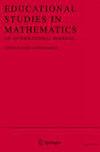Shame, entitlement, and the systemic racism of mathematics “ability” grouping in Aotearoa New Zealand
IF 1.9
2区 教育学
Q1 EDUCATION & EDUCATIONAL RESEARCH
引用次数: 0
Abstract
Abstract Decades of research has documented the consequences of allocating school students into a hierarchy of classes with narrow ranges of mathematics attainment, a process known as streaming, tracking, setting, or “ability” grouping. The purported benefits of streaming are inconsistent and disputed, but the harms are clear, in particular, (1) the limiting curriculum often available in low streams and (2) the loss of self-confidence that results from being positioned in a low stream. Building on this foundation, we discuss streaming in mathematics as tied to systemic racism in Aotearoa New Zealand, where the harmful effects of streaming fall most heavily on Māori and Pasifika students. Previous analyses of race and streaming have focused primarily on the racial composition of streamed classes, bias in stream allocation, and racialised teacher expectations in streamed settings. In contrast, we focus on the emotional consequences of streaming, arguing that streaming produces racialised emotions of shame and entitlement as unintended but predictable consequences. We illustrate the racialised production of entitlement and shame through collaborative storying, interweaving our own biographies with a re-analysis of student interviews from two prior studies.羞耻、权利和新西兰奥特罗阿数学“能力”分组的系统性种族主义
几十年的研究记录了将学校学生按数学水平划分为不同等级的后果,这一过程被称为流、跟踪、设置或“能力”分组。所谓的分流的好处是不一致的和有争议的,但危害是明确的,特别是,(1)有限的课程通常在低流和(2)由于被定位在低流导致的自信心的丧失。在此基础上,我们讨论了与新西兰奥特罗阿地区的系统性种族主义有关的数学流化,在那里,流化的有害影响对Māori和Pasifika学生的影响最为严重。先前对种族和流媒体的分析主要集中在流媒体课堂的种族构成、流媒体分配中的偏见以及流媒体环境中种族化的教师期望上。相比之下,我们关注的是流媒体的情感后果,认为流媒体会产生种族化的羞耻和权利情绪,这是意想不到但可预见的后果。我们通过合作的故事来说明权利和羞耻的种族化生产,将我们自己的传记与之前两项研究的学生访谈重新分析交织在一起。
本文章由计算机程序翻译,如有差异,请以英文原文为准。
求助全文
约1分钟内获得全文
求助全文
来源期刊

Educational Studies in Mathematics
EDUCATION & EDUCATIONAL RESEARCH-
CiteScore
5.60
自引率
9.40%
发文量
65
期刊介绍:
Educational Studies in Mathematics presents new ideas and developments of major importance to those working in the field of mathematics education. It seeks to reflect both the variety of research concerns within this field and the range of methods used to study them. It deals with methodological, pedagogical/didactical, political and socio-cultural aspects of teaching and learning of mathematics, rather than with specific programmes for teaching mathematics. Within this range, Educational Studies in Mathematics is open to all research approaches. The emphasis is on high-level articles which are of more than local or national interest.? All contributions to this journal are peer reviewed.
 求助内容:
求助内容: 应助结果提醒方式:
应助结果提醒方式:


